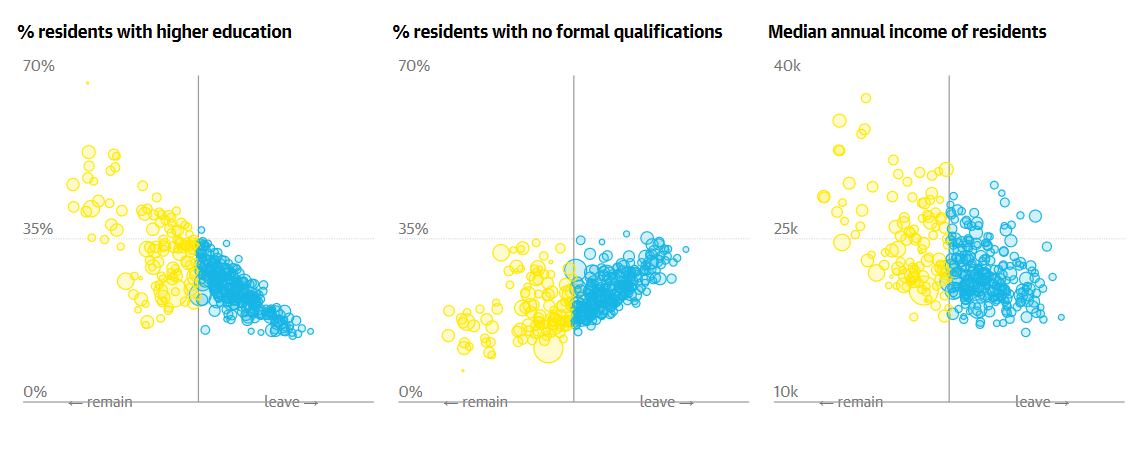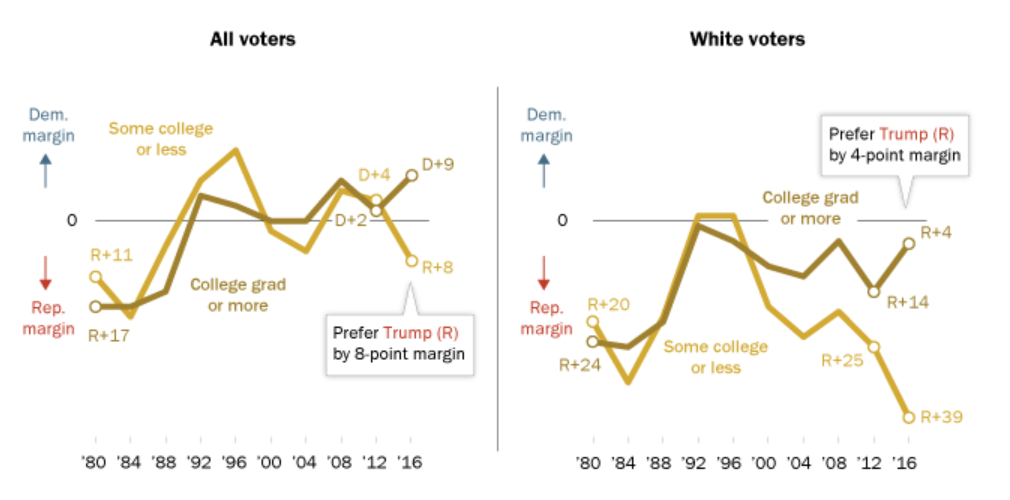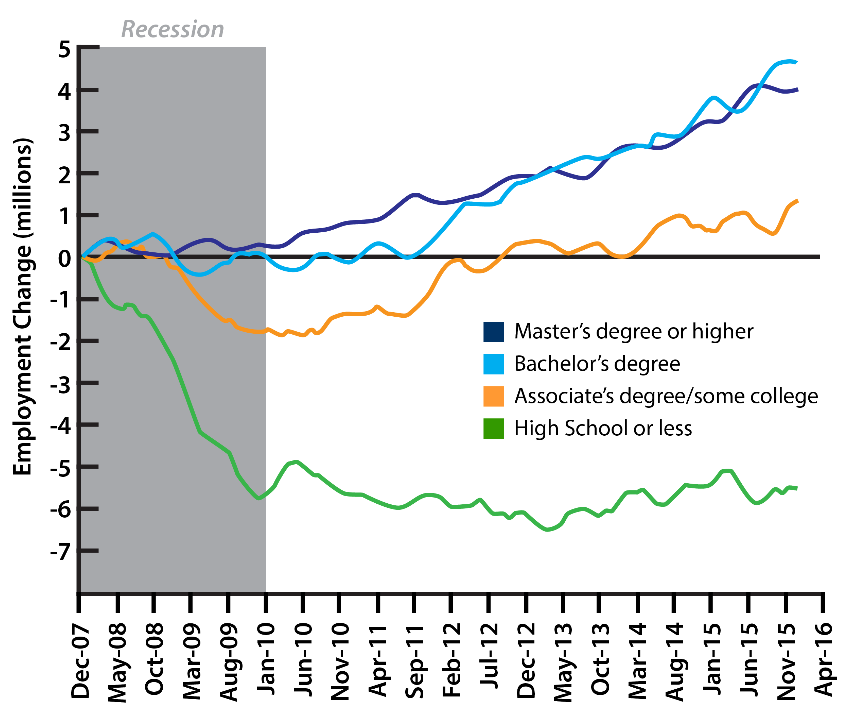On the causes of Brexit and Trumpageddon
Geoffrey M. Hodgson
First published 27 November 2016
What lay behind the Brexit vote and the election of Donald Trump? In my previous blog
I noted those who blamed “globalisation” or “neoliberalism”. There are some grains of truth in their arguments. But, intentionally or otherwise, they fall into a Marxist trap of seeing the growth of markets and the logic of global capitalism as somehow to blame.
This gives the far-leftists the nudge: overthrow capitalism and the problems will be solved. That, of course, is baloney.
A major problem with putting the blame on “neoliberalism” (understood as the ideology of free-markets, privatisation and a smaller state) is that its influence dates back to the 1970s, but the intervening years have seen the repeated election successes of non-bigoted centre-left politicians such as Tony Blair and Barack Obama.
Although Blair and Bill Clinton promoted some financial deregulation, they supported more state intervention in other spheres.
As Rajesh Venugopal, Colin Talbot and others have persuasively elaborated, there is an extreme ambiguity in the term “neoliberalism”.
Blaming “the forces of globalisation” faces similar problems of timing. The modern growth of markets and global finance accelerated after China began reform in 1978 and after the fall of the Berlin Wall in 1989.
The causes of the 23 June Brexit vote to leave the European Union and of the election of Trump on 8 November 2016 are varied and complex. Here there is scope for many PhD theses and professorial academic tomes. We await this further enlightenment.
I achieve no more than a brief preliminary analysis here. I point to leading factors which may be responsible. These few factors counter the view that “neoliberalism” is the source “of all our problems”. Instead they point to a more immediate and practical agenda to counter racism and nationalist populism.
Who voted for Brexit?
The polling data give us a picture of the social groups who voted for Brexit and for Trump. Let’s take Brexit first. The charts below show that age and the levels of education and income were major factors. The poorer and less-well-educated voted for Brexit.


Brexit: key factors by local authority area
Source: The Guardian
Who voted for Trump?
Education levels were also significant in the election of Trump. The charts below show voter preferences in US presidential elections from 1980 to 2016. Comparing the 2016 presidential election with its predecessors, a wide gap in presidential preferences emerged between those with and without a college degree.
Data from the Pew Research Center show that college graduates backed Hillary Clinton by a 9-point margin, while those without a college degree backed Trump 52%-44%. This is by far the widest gap in polls since 1980. Trump’s margin among whites without a college degree is the largest among any candidate in exit polls since 1980. Two-thirds of non-college whites backed Trump, compared with just 28% who supported Clinton. Trump voters were also more likely to be male.

Educational attainment and voter preferences in US presidential elections
Source: Pew Research Center
But unlike Brexiteers, Trump supporters were more likely to be wealthy. Broken down by income bracket, 52% of voters earning less than $50,000 a year – who make up 36% of the US electorate – voted for Clinton, and 41% for Trump. But among the 64% of US voters who earn more than $50,000 a year, 49% chose Trump, and 47% Clinton.
Consequently, a key common factor behind both Brexit and Trumpageddon is the level of support they achieved among the less well educated. But we then have to explain why levels of education mattered so much more in 2016 than in preceding years.
Economic shocks: recession and austerity
What had changed in the years immediately before 2016 to cause many of the less well educated to vote for Brexit in the UK and Trump in the US? Concerning the US, the chart below carries a very strong message.

US employment change by educational level, 2007-2016
Source: The American Interest
The above chart shows clearly that job losses from the post-2007 downturn were much greater among those lacking a college education. Most of the blue-collar and service sector jobs that disappeared in 2008 have not returned to the US.
The hit of the recession on jobs for the less well educated in the UK has been less dramatic. But the rending of the fabric of working class society in Britain has been as severe as in the US. Particularly hard-hit have been the formerly industrial areas in the North of England, Wales and Scotland.
Decades of globalisation had already led to big losses of manufacturing jobs in the US and UK. But the economic crash – and the lack of adequate investment in retraining – dramatically exacerbated the problem. Lower-education, low-mobility groups in the population were the most adversely affected.
To add to the recession, in 2010 a Conservative-led government was elected, committed to a drastic programme of cuts in public spending. At the level of local authorities, spending per person fell by 23% in real terms, on average, from 2009 to 2015.
There is some evidence (with important caveats) to suggest that local authorities experiencing more fiscal cuts were more likely to vote in favour of leaving the EU. But it was not a reaction to austerity alone, because in 2015 the austerity-promoting Conservatives won an overall majority in the general election.
It was more to do with how the low-paid workers and welfare dependents reacted to their plight. As Simon Wren-Lewis put it: “when things get tough, people become much more receptive to potential unfairness. It is what helps drive a belief that welfare goes to scroungers”.
This belief gained its strongest support among the least educated. Fed lies and distortions by the likes of Fox News and the Daily Mail, these social strata were the recruiting ground for racist and nationalist populism in the UK and US.
The post-2007 economic shocks were preceded by years of wage stagnation for working people in both countries. One UK analysis showed that over half of working Britain has seen no rise in living standards since 2003. It identified stagnating living standards as an important background to rising dissatisfaction with the economic and political status quo, particularly among poorer households.
In the US, a major stagnation in wage levels dates back to the 1970s. A US survey shows that from 1979 to 2015, low-wage workers’ real wages fell 5%, middle-wage workers’ wages rose only 6%, while those with very high wages saw a 41% increase. (Low wage is 10th percentile, middle wage is 50th percentile, very high wage is 95th percentile.) As Nils Gilman wrote:
“the level of social destruction that has unfolded in the United States over the past few decades is hard to overstate. Whole communities, especially in the small towns and rural areas, have experienced wholesale economic and social collapse, as documented in a diverse array of books … . For the traditional working classes, gone are not only jobs but also the wellsprings of traditional forms of social esteem, replaced with a blighted landscape of deindustrialization, drug addiction, and elite disdain. To be sure, African-Americans have been experiencing this sort of social devastation forever; what is new is whites experiencing the same …”
Against this background of long-term developments and policy failures, a series of economic and social forces have been unleashed in the last decade. It is important to emphasise that Brexit and Trumpageddon cannot be explained by economic factors alone.
Another shock: mass immigration
Despite unceasing inflows, in the US, the number of immigrants as a percentage of the total population declined from 14.7% in 1910 to 4.7% in 1970. Since then the figure has steadily risen, reaching 13.5% in 2015. (Here “immigrants” refers to people residing in the United States who were not U.S. citizens at birth.) Much of this post-1970 increase in US immigration is Hispanic – hence Trump’s demagoguery about “building a wall” between the US and Mexico.
In the UK the annual gross immigration flow has more than tripled from 201,000 in 1982 to 632,000 in 2014. In 33 years the percentage of foreign-born UK residents more than doubled from 6.2% in 1981 to 13.0% in 2014. Much of this immigration has come from former colonies – particularly from Ireland, the Indian subcontinent, Africa and the Caribbean. In more recent years a large number of Eastern Europeans have taken up residence in the UK.
Added to these rising flows, in 2015 and 2016 the world saw pictures of many thousands of Syrians, Iraqis, Afghanis and Africans desperately trying to escape war, poverty and persecution. Many chose Europe as their destination.
These long-term and short-term conditions – stagnant living standards, cuts in welfare, a dislocated social fabric, and mass immigration – created the conditions for racist bigots and nationalistic populists to garner support.
They were most effective in persuading the least educated. The results were Brexit and Trumpageddon.
Inadequate explanations
The ideology of “neoliberalism” – if that includes austerity and attacks on the welfare state – has played a role in these two events. But, contrary to Naomi Klein and George Monbiot, “neoliberalism” offers a fragment of an adequate explanation of the whole.
Jeremy Corbyn put Trump’s victory down to “the forces of globalisation during the Obama administration”. Indeed, globalisation and deindustrialisation have been hugely disruptive. But Corbyn overlooked the benefits of globalisation, alongside its costs.
Arguably, globalised markets have led to significant increases in the standard of living of many people. They has certainly helped increase the standard of living of numerous workers in China and India, lifting many millions out of poverty. But this does not mean that we should push globalisation to the limit, to the point that it undermines the effective sovereignty of national democracies.
Corbyn blamed Barack Obama’s presidency, which started in 2009, but he overlooked the fact that globalisation and deindustrialisation were well under way in the 1970s and 1980s. Corbyn also hinted that “free market, economic thinking” was to blame, portending his statist-socialist disposition toward wholesale public ownership.
Corbyn, Klein and Monbiot are quasi-Marxists who blame the core institutions of capitalism for all problems. They imply some kind of radical alternative to capitalism but they are dreadfully vague on all the details. This combination of sweeping diagnosis and vague remedy is irresponsible leftism at its worst.
Instead we need to focus more concretely on what went wrong, and to develop measures by which as progressive and pragmatic left can put modern capitalist democracies on a different course.
What Corbyn, Klein and Monbiot have so far underestimated is the role of education – or the lack of it – and the impact of mass immigration on fractured and alienated working class communities.
Education and assimilation
Developments within capitalism have made access to education a crucial issue. These trends, over the last hundred years, are very different from those predicted by Karl Marx, who saw capitalism as leading to widespread deskilling. Although some deskilling happens, and more could happen, the general trajectory for the last 200 years has been for more and more jobs that involve advanced knowledge and training.
As Alfred Marshall pointed out in his Principles of Economics, machines first replace the most monotonous and muscular labour. Other forms of work, involving adaptive skills and judgment, are less-readily replaceable by machines. There are greater and cheaper possibilities for creating machines to do simple and repetitive work, compared with getting machines to carry out sophisticated, analytical and creative tasks.
Consequently, as I pointed out in my Economics and Utopia
and Conceptualizing Capitalism
books, a key problem for modern capitalism is to ensure that as many people as possible are educated and trained for the highly skilled and specialist jobs that are generated by rapidly advancing technology and ever-more complex organisation.
If there is a failure to provide adequate education and training for all, then there is a danger of creating an unskilled and socially excluded underclass, eking out an impoverished existence in shanties, trailer parks, or sink housing estates. A major result is increasing economic inequality and festering resentment against those fare better. This massive policy failure has become evident in the UK and US since the 1980s. It has created some of the conditions for Brexit and Trump.
We cannot rely on markets for a solution here. The existence of wage-labour under capitalism means that there cannot be anything approaching a complete futures market for labour. For there to be full futures markets for labour, all workers must enter into contracts for their expected working life. This would be tantamount to voluntary bondage, limiting the freedom of workers to quit their employment. Paradoxically, pushing markets to their limits would mean the return of slavery for the workforce.
As Marshall also pointed out in his Principles, this creates a problem for employers. If the employer spends money on employee training and skill development, then this investment is lost when the worker leaves. As a result, without compensatory arrangements, employers might under-invest in human learning and education.
The state should step in and take the place of these missing markets. Otherwise capitalism produces a permanent skills deficit. In the US and the UK, the responses have been inadequate, leading to an alienated and disillusioned underclass.
Instead of appealing to progressive liberals for policies to deal with their plight, immigrants have provided their scapegoats. Education is vital, but the sources of prejudice have to be tackled as well.
The Left has to talk about immigration. But it is not a numbers game. Immigration can hugely benefit our economy and our culture. The key problem is assimilation, within an overarching system of laws and values that can accommodate diversity, subject to the common observance of basic human liberties and rights.
But that is a topic for another blog.
27 November 2016
Minor edits – 30 November 2016
Bibliography
Becker, Sascha O. Thiemo Fetzer and Dennis Novy (2016) ‘The fundamental factors behind the Brexit vote’, Vox, 31 October. http://voxeu.org/article/fundamental-factors-behind-brexit-vote.
Elgot, Jessica (2016) ‘Corbyn backs reduction of NATO presence along Russia’s borders’, The Guardian, 13 November. https://www.theguardian.com/politics/2016/nov/13/jeremy-corbyn-hints-at-reducing-nato-presence-russia-putin?CMP=share_btn_tw.
Gilman, Nils (2016) ‘Technoglobalism and its Discontents’, The American Interest, 12 September. http://www.the-american-interest.com/2016/09/12/technoglobalism-and-its-discontents/.
Hodgson, Geoffrey M. (1999) Economics and Utopia: Why the Learning Economy is not the End of History
(London and New York: Routledge).
Hodgson, Geoffrey M. (2015) Conceptualizing Capitalism: Institutions, Evolution, Future
(Chicago: University of Chicago Press).
Hodgson, Geoffrey M. (2018) Wrong Turnings: How the Left Got Lost
(Chicago: University of Chicago Press, forthcoming).
Klein, Naomi (2016) ‘It was the Democrat’s embrace of neoliberalism that won it for Trump’, The Guardian, 9 November. https://www.theguardian.com/commentisfree/2016/nov/09/rise-of-the-davos-class-sealed-americas-fate.
Marshall, Alfred (1920) Principles of Economics: An Introductory Volume
(London: Macmillan). [See pages 263 and 565 on skill development.]
Monbiot, George (2016a) ‘Neoliberalism – the ideology at the root of all our problems’, The Guardian, 15 April. https://www.theguardian.com/books/2016/apr/15/neoliberalism-ideology-problem-george-monbiot.
Monbiot, George (2016b) ‘Neoliberalism: the deep story that lies beneath Donald Trump’s triumph’, The Guardian, 14 November. https://www.theguardian.com/commentisfree/2016/nov/14/neoliberalsim-donald-trump-george-monbiot.
O’Hara, Glen (2016) ‘Stop saying that Trumpism is about economics’, 15 November. http://publicpolicypast.blogspot.co.za/2016/11/stop-saying-that-trumpism-is-about.html.
Rodrik, Dani (2011) The Globalization Paradox: Why Global Markets, States, and Democracy Can’t Coexist
(Oxford and New York: Oxford University Press).
Talbot, Colin (2016) ‘The myth of neoliberalism’, 31 August. https://colinrtalbot.wordpress.com/2016/08/31/the-myth-of-neoliberalism/.
Venugopal, Rajesh (2015) ‘Neoliberalism as a Concept’, Economy and Society, 44(2), pp. 165-87. http://www.tandfonline.com/doi/abs/10.1080/03085147.2015.1013356.
